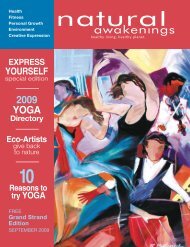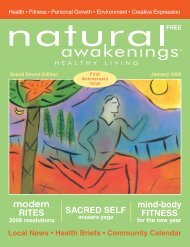March 2008 - Grand Strand Natural Awakenings
March 2008 - Grand Strand Natural Awakenings
March 2008 - Grand Strand Natural Awakenings
- No tags were found...
Create successful ePaper yourself
Turn your PDF publications into a flip-book with our unique Google optimized e-Paper software.
In Pursuit of Plenty:A Nutritional Programfor Drug DetoxificationBy Chance Diebold, NMDIn fact, few diseases have as muchimpact on our nation’s communitiesas do addiction disorders.Talking about addiction and addictive behavior is nevereasy. Many people mistakenly believe that if onlyone had willpower, they could simply stop drinkingor abusing drugs. Yet these abuse disorders needto be treated holistically – body, mind, and spirit – because,without help, addiction is uncontrollable, a craving, whichescalates over time. How should we begin to talk about addictionin a meaningful way, one which helps us to better understandthat addiction disorders are complex, occur amongall age groups and are not limited to any one socioeconomicclass, race, or era? Even in the late 19th century, drugs werenot new; very proper people in society were also addicted.Ah, laudanum...how many of those highly regarded Victorianladies with vague illnesses passed their days resting on achaise lounge, in essence ‘wasted’? They would have voicedladylike distain at the opium dens, so prevalent at the turn ofthe last century, whilst failing to see they too were ‘junkies’.Addiction is growing in our society. In fact, few diseaseshave as much impact on our nation’s communities as do addictiondisorders. In the United States, over ¼ million deathsoccur every year as a result of alcoholism and illegal druguse. Recent studies report the daily use of addictive substancesby high school seniors as 2% for marijuana, 9% forcocaine and 4% for alcohol. In fact, alcoholism is the mostprevalent addictive disease in this countrytoday. More than 1 in 4 people (nearly27%) between the ages of 18 and 64years meet the diagnostic criteria foralcohol dependency, and according toestimates, 1 of every 5 patients admittedto a hospital is an alcohol abuser. Just think,15 million Americans are reported to have alcoholproblems, though fewer than 5 out of every 100 receivetreatment.The truth is, we have become a drug-dependant culture,and literally thousands of substances are used every daythroughout the country, without a thought given to their longterm effect. Western medicine, very much a drug-orientedsystem, reinforces this trend. Advertisers spend lots of moneyevery day to convince us that we can get a ‘quick fix’ forwhatever ails us. Commercials on T.V. run incessantly. Have aproblem? Pop a pill for instant relief. We consume mountainsof pills – be it to cause an erection or stop insomnia – to thetune of $275 billion dollars spent on pharmaceutical drugsalone last year. These figures do not include over the counteror illicit drugs, or the everyday use of caffeine, alcohol,and nicotine. Did you know that you can buy peppermintscented, caffeinated soap? A can of Red Bull has only 80milligrams of caffeine but Shower Shock Caffeinated soaphas 200 milligrams of caffeine per serving (12 servings perbar). So, you don’t even have to stop by the local coffee shopanymore for your legal caffeine ‘fix’.Everything we do can be taken to an extreme and havea harmful impact on our lives. So, we need to look at therelationship between how we feel and whether we maintainonly those habits which increase health and well being. Incoming to grips with any kind of addiction, it is vital to identifywhether we must use increasingly more of the substancefor the same effect, find it impossible to use in moderationlike other people, are unsuccessful in our efforts to cut down,spend a lot of time thinking about or getting the substance,or whether we continue to use it despite its causing personalproblems.So many people try to correct unpleasant feelings orpersonality traits chemically, and while this immediate reliefmay seem practical, drugs rarely fix anything. They do,however, mask symptoms. Symptoms are not problems, butthe result of deeper processes and imbalances that shouldbe addressed directly and holistically. Most drugs also haveboth physiological and psychological actions, and potentialfor addiction, so it is always wise to prepare for drug/chemi-28 <strong>Grand</strong> <strong>Strand</strong>




